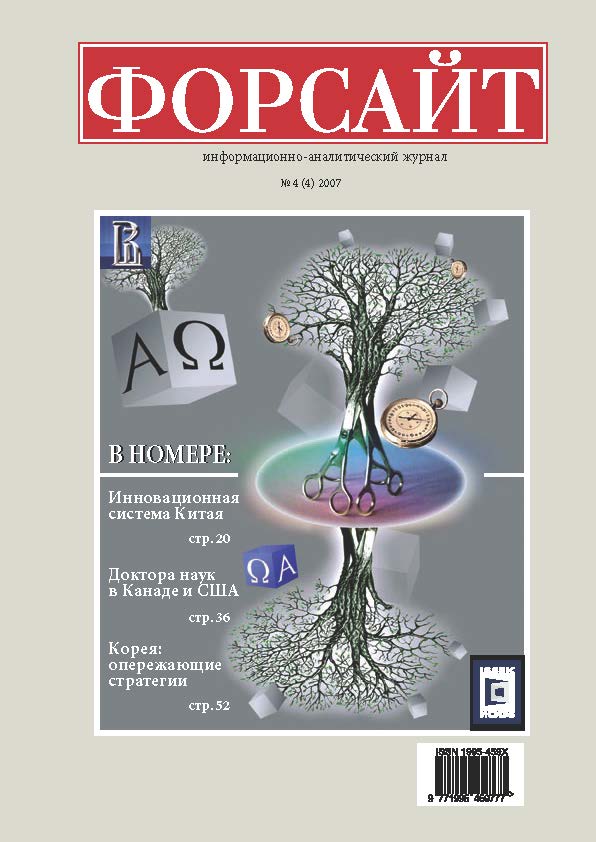Аннотация
Общепринятая теория интеллекта развивается преимущественно в рамках рационального критического мировоззрения. Чаще всего обсуждаются психометрическая и системная теории интеллекта. Однако предметом настоящей статьи являются некоторые более перспективные теории, которые, оставаясь в рамках традиционных научных представлений, описывают, в частности, эмоциональный, креативный, внутриличностный интеллект и мудрость. Конечно, возможны и другие представления об интеллекте. Среди них, например, интегральный интеллект – концепция, в которой признается и эффективно используется представление о межличностных потенциалах разума. Это альтернативная теория, и в данной статье общепринятые теории анализируются, сравниваются и противопоставляются именно теории интегрального интеллекта. Рассматривается вопрос о том, как отразится на будущем дискурса по теории интеллекта возможное признание интегрального интеллекта.
Литература
Anthony M. A genealogy of the western rationalist hegemony // Journal of Futures Studies, v. 11 (1), 2006.
Anthony M. Education for transformation: integrated intelligence in the knowledge economy and beyond // Journal of Futures Studies, v. 9 (3), 2005, pp. 31-35.
Anthony M. Integrated intelligence and the pychospiritual imperatives of mechanistic science // Journal of Futures Studies, v. 10 (1), 2005, pp. 31-47.
Anthony M. Integrated intelligence: The future of intelligence? // Journal of Futures Studies, 8 (2), 2003, pp. 39-54.
Anthony M. Integrated intelligence: classical and contemporary depictions of mind and intelligence and their educational implications. London: Sense Publishers, 2007.
Braud W. Distant Mental Influence. Charlottesville: Hampton Roads, 2003.
Broomfield J. Other Ways of Knowing. Rochester: Inner traditions, 1997.
Czikszentmihalyi M. A Psychology for the Third Millennium. New York: Harper Perennial, 1994.
Deary I. Intelligence: A Very Short Introduction. New York: Oxford University Press, 2001.
Dewey J. Cultivating Society's Civic Intelligence: Patterns for a New «World Brain» // Journal of Society, Information and Communication, v. 4 (2), 1937.
Eysenck H. Intelligence: A New Look. New York: Transaction, 2002.
Ferrer J. Revisioning Transpersonal Theory. New York: State University of New York Press, 2002.
Fromberg D. The Intuitive Mind and Early Childhood Education. In: Torff B., Sternberg R. (Eds.) Understanding and Teaching the Intuitive Mind. Mahwah: Lawrence Erlbaum Associates, 2001. PP. 93-114.
Gardner H. Frames of Mind: The Theory of Multiple Intelligences (10th Anniversary Edition). New York: Basic Books, 1993.
Gardner H. Intelligence Reframed. New York: Basic Books, 1999.
Gardner H. Multiple Intelligences: The Theory in Practice. New York: Basic Books, 1993.
Gardner H. Three Distinct Meanings of Intelligence. In: Sternberg R., Lautry J., Lubart T. (Eds.). Models of Intelligence: International Perspectives. Washington: American Psychological Association, 2003. PP. 43-54.
Gardner H., Kornhaber M. L., Wake W. K. Intelligence: Multiple Perspectives. New York: Harcourt Brace College, 1996.
Goleman D. Working With Emotional Intelligence. New York: Bantam Books. 1999.
Grof S. Beyond the Brain. New York: State University of New York Press, 1985.
Grof S. Psychology of the Future. New York: Suny, 2000.
Hawkins D. Power vs. Force: An Anatomy of Consciousness. London: Hay House, 2002.
Hernstein R., Murry C. The Bell Curve: Intelligence and Class Structure in American Life. New York: Free Press, 1994.
Inayatullah S. Questioning the Future: Futures Studies, Action Learning and Organizational Transformation. Taipei: Tamkang University Press, 2002.
Jensen A. The g factor. The Science of Mental Ability. Westport: Praeger, 1998.
Jiyu R. (Ed.) The Book of Lao Zi. Beijing: Foreign Languages Press, 1998.
Klein G. The Power of Intuition. New York: Doubleday, 2003.
Kosko B. Fuzzy Thinking. London: Harper Collins, 1993.
Kunzmann U., Baltes P. Beyond the Traditional Scope of Intelligence: Wisdom in Action. In: Sternberg R., Lautry J., Lubart T. (Eds.). Models of Intelligence: International Perspectives. Washington: American Psychological Association, 2003. PP. 329-343.
Lawlor R. Voices of the First Day: Awakening in the Aboriginal Dreamtime. Vermont: Inner Traditions, 1991.
Lubart T. In Search of Creative Intelligence. In: Sternberg R., Lautry J., Lubart T. (Eds.). Models of Intelligence: International Perspectives. Washington: American Psychological Association, 2003. PP. 279-292.
Murinbata T., Whitehead C. Why Consciousness Conferences Are Not Really Getting Us Anywhere. 2002. www.imprint.co.uk / pdf.
Nash R. Cognitive Habitus and Collective Intelligence // Journal of Educational Policy, v. 20 (1), 2005, pp. 3-21.
Owusu-Bempah K., Howitt D. Psychology Beyond Western Perspectives. Leicester: The British Psychological Society, 2000.
Plucker J. History of Influences on the Development of Intelligence Theory and Testing. 2003. www.indiana.edu / ~intell / map. shtml.
Radin D. Entangled Minds. New York: Paraview, 2006.
Rowan R. The Intuitive Manager. New York: Berkley, 1991.
Salovey P., Mayer J. Emotional Intelligence. Imagination, Cognition, and Personality. 9, 1990, pp. 185-211.
Salovey P., Pizarro A. The Value of Emotional Intelligence. In: Sternberg R., Lautry J., Lubart T. (Eds.). Models of Intelligence: International Perspectives. Washington: American Psychological Association, 2003. PP. 169-181.
Shearer B. Multiple Intelligences Theory after 20 Years // Teachers College Record, v. 106 (1), 2004, pp. 2-16.
Sheldrake R. The Sense of Being Stared At and Other Aspects of the Extended Mind. London: Arrow Books, 2003.
Sheldrake R., McKenna T., Abraham R. Chaos, Creativity, and Cosmic Consciousness. Rochester: Park Street Press, 2001.
Sternberg R. Construct Validity of the Theory of Successful Intelligence. In: Sternberg R., Lautry J., Lubart T. (Eds.). Models of Intelligence: International Perspectives. Washington: American Psychological Association, 2003. PP. 55-77.
Sternberg R. Wisdom, Intelligence and Creativity Synthesized. Cambridge: Cambridge University Press, 2003.
Sternberg R., Lautry J., Lubart T. Where Are We in the Field of Intelligence, How Did We Get Here, and Where Are We Going? In: Sternberg R., Lautry J., Lubart T. (Eds.). Models of Intelligence: International Perspectives. Washington: American Psychological Association, 2003. PP. 3-25.
Szuba T. Was There Collective Intelligence Before Life On Earth? // World Futures, v. 58, 2002, pp. 61-80.
Targ R., Katra J. Miracles of Mind: Exploring Nonlocal Consciousness and Spiritual Healing. Novato: New World Library, 1999.
Tarnas R. The Passion of the Western Mind. London: Pimlico, 2000.
Terman L. Intelligence and It's Measurement // Journal of Educational Psychology, v. 12 (3), 1921, pp. 127-133.
Torff B., Sternberg R. (Eds.). Understanding and Teaching the Intuitive Mind. Mahwah: LEA Books, 2001.
Wilber K. Sex, Ecology, Spirituality. Boston: Shambhala, 2000.
Zohar D. Spiritual Intelligence. London: Cygnus Books, 2000.
de Bono E. Six Thinking Hats. London: Penguin, 1999.

Это произведение доступно по лицензии Creative Commons «Attribution» («Атрибуция») 4.0 Всемирная.

